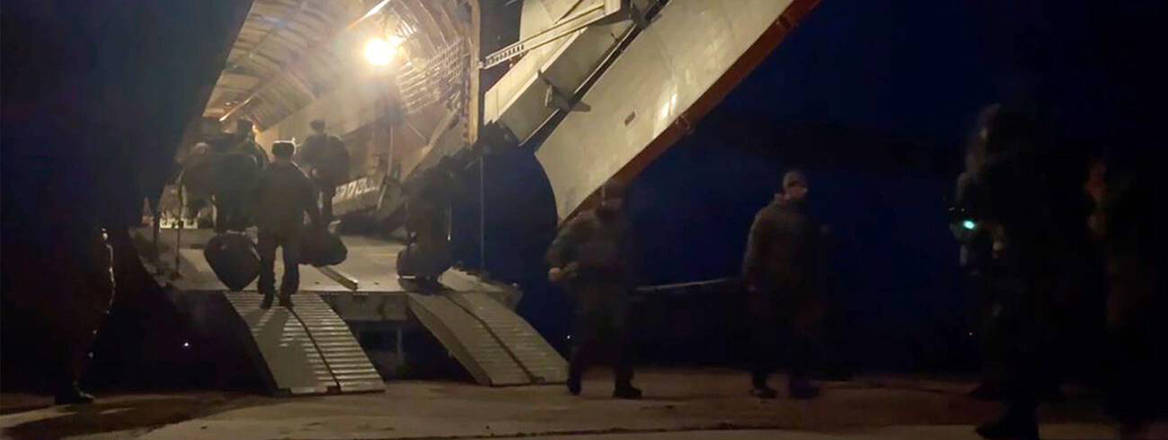Russia’s Response to Unrest in Kazakhstan: Risk Versus Reward
The Russian-led ‘peacekeeping’ operation has helped to restore state order, but how will it respond to an escalation of violence?
The outbreak of unrest across Kazakhstan at the beginning of 2022 took international audiences by surprise. The protests, which were triggered by rising fuel prices, quickly morphed into demonstrations across the country against elite corruption and inequality. In the violence that followed, a dozen members of the security forces were killed and hundreds wounded, while approximately 1,000 people have reportedly been injured and public buildings have been burned.
On 5 January, Kazakh President Kassym-Jomart Tokayev made a request to the Collective Security Treaty Organisation (CSTO), a Russian-led regional security organisation, to provide assistance in neutralising the ‘terrorist threat’. For the first time in its history, the CSTO decided to deploy a collective ‘peacekeeping’ force. While the CSTO is a collective defence organisation, given the extent to which member states jealously guard their sovereignty, the CSTO had to present the unrest as externally orchestrated in order to justify intervention.
As the CSTO’s framework state, Russia has led the regional response. The decision to intervene is linked to what Moscow views as a deteriorating regional situation characterised by growing disorder and instability. The Kremlin is concerned about the attendant consequences of state collapse in Kazakhstan and its implications for regional security. This is closely related to Russian unease about a potential change in leadership and thus a step change in Kazakhstan’s foreign policy direction away from the gravitational pull of Moscow. In short, Moscow was compelled to act.
If there are future flareups and the CSTO fails to defend state order, the CSTO – and by extension Moscow – could lose credibility
But Russia’s deployment to Kazakhstan carries both risks and rewards. Although Russian support is critical to the survival of the Kazakh leadership, the limited mandate of the CSTO’s response is deliberate. According to the Russian Ministry of Foreign Affairs, the mission is a ‘counter-terrorist operation’ to ensure the protection of civilians and critical infrastructure. Yet this reference to the protection of civilians is nothing more than an attempt to legitimise the operation, while Russia’s cautious support role is intended to help restore state order.
If the CSTO limits itself to this defensive posture it will minimise the risk of being drawn into any further violence, while achieving its stated operational objectives. Arguably, this would be an easy win for the Kremlin, which could be presented as a foreign policy achievement to domestic and international audiences and used to silence criticism of the CSTO as well as enhance Russia’s standing as a dependable ally. A cautious response would minimise the risk to Russian soldiers, which, given the casualties incurred in Ukraine and Syria, would be well received by the Russian public.
At the same time, if there are future flareups and the CSTO fails to defend state order, the CSTO – and by extension Moscow – could lose credibility. Moreover, if Kazakh security forces start to target demonstrators en masse, this would put the Kremlin in an extremely difficult situation given its declared commitment to the protection of civilians ‘without exception’.
Should the conflict intensify, Moscow has two further options. The first is to withdraw. Russia is of course no stranger to vicious intra-state struggles and, although a Russian withdrawal would remove the risk to its forces, a premature exit could have long-term strategic consequences. It could damage Russia’s status as the neighbourhood’s self-proclaimed security guarantor – a role that the Kremlin has coveted since the 1990s – and would signal to regional leaders that Moscow could no longer be relied upon to provide regime protection.
Russia runs the risk of getting drawn into a conflict that it cannot control and, with its commitments elsewhere in the neighbourhood, would be in danger of diplomatic and military overstretch
Still, it is unclear whether Russia’s withdrawal would drive Central Asian states into strategic partnerships with other powers. Although Moscow has competed with the likes of China and the US since the 2000s, its military presence and political influence are unparalleled across the region. China is the obvious alternative partner state; however, Beijing’s engagement is limited to trade and investment, and there are no signs that it is seeking leadership in regional affairs. Other potential options include Iran and Turkey, but their roles do not compare with Russia’s dominance and China’s economic clout.
The second and most controversial option is a more active response to suppress the civil unrest. Potentially, the use of force would discourage any further turbulence in Kazakhstan and preserve regime stability across the region. A more active response would provide experience of joint operations through CSTO structures.
But Russia runs the risk of getting drawn into a conflict that it cannot control and, with its commitments elsewhere in the neighbourhood, would be in danger of diplomatic and military overstretch. Should Moscow choose to respond with force, this would likely result in casualties which would be deeply unpopular with the Russian public. And if Russian forces were complicit in suppressing a popular uprising, this would undoubtedly damage Moscow�’s reputation in the eyes of regional populations suffering at the hands of oppressive regimes. A more forceful response could also unintentionally escalate a conflict along Russia’s porous southern border.
For now, Moscow’s defensive posture is probably the most strategically prudent option, particularly since the Kazakh leadership claims to have restored order across the country. But if there is an escalation of violence, Russia faces difficult choices ahead.
The views expressed in this Commentary are the author’s, and do not represent those of RUSI or any other institution.
Have an idea for a Commentary you’d like to write for us? Send a short pitch to commentaries@rusi.org and we’ll get back to you if it fits into our research interests. Full guidelines for contributors can be found here.


